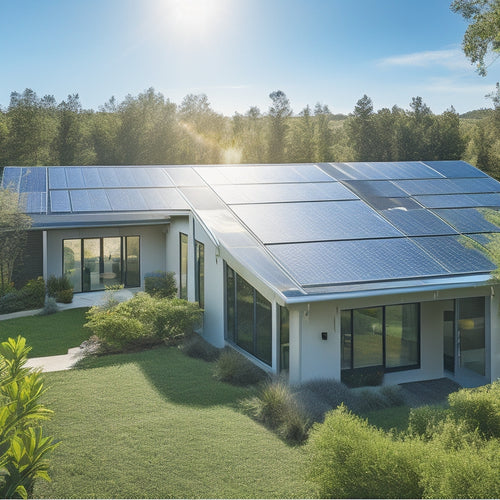
Cost of Home Solar Battery
Share
You're looking to invest in a home solar battery to reduce your grid reliance, but you're curious about the cost. The cost of a home solar battery varies depending on the type, with deep cycle batteries lasting 5-15 years and lithium-ion batteries offering a longer cycle life of around 5,000 to 7,000 charge cycles. Inverter compatibility and type also impact the overall cost, with string inverters being cost-effective but potentially struggling with shading issues. By considering these factors, you can optimize your energy storage system and maximize your savings on energy bills. Now, let's dig deeper into the details that'll help you make an informed decision.
The Essentials
- The cost of a home solar battery depends on the type, capacity, and cycle life, with lithium-ion batteries being a popular and efficient option.
- A typical home solar battery can cost between $5,000 to $15,000 or more, depending on the system's size and complexity.
- The overall cost of a solar battery system is affected by the inverter type, installation costs, and warranty options.
- While the upfront cost may seem high, home solar batteries can provide significant long-term savings through reduced energy bills and increased energy independence.
- Researching and comparing different solar battery options can help homeowners make an informed decision and find a cost-effective solution for their energy needs.
Energy Independence at Night
You're likely wondering how you can maintain energy independence at night, when the sun isn't shining.
With a home solar battery, you can store excess energy generated during the day for use after sunset, ensuring you have power when you need it.
By integrating a Residential Energy Storage System with your solar panels, you can optimize your energy consumption and reduce your reliance on the grid.
This nighttime energy storage capability allows you to enjoy the benefits of solar power around the clock.
Nighttime Energy Storage
As the sun sets and your solar panels stop generating electricity, nighttime energy storage takes over, allowing you to maintain energy independence even in the dark hours. This is where your solar battery comes into play, providing a reliable source of power when you need it most. With the right energy storage solutions, you can enjoy the freedom of using electricity on your own terms, without relying on the grid.
There are several solar battery types to choose from, each with its own unique characteristics and benefits. Here's a comparison of some popular options:
| Solar Battery Type | Cycle Life | Depth of Discharge |
|---|---|---|
| Lead-Acid | 200-500 cycles | 50% |
| Lithium-Ion | 3,000-5,000 cycles | 80% |
| Sodium-Ion | 2,000-3,000 cycles | 70% |
When selecting a solar battery, consider factors such as cycle life, depth of discharge, and overall cost. By choosing the right energy storage solution for your needs, you can guarantee a smooth conversion to nighttime energy storage and maintain your energy independence.
Power After Sunset
With your solar panels no longer generating electricity after sunset, your solar battery takes center stage, supplying power to your home and guaranteeing energy independence throughout the night. This is where your solar investment truly pays off, as you can enjoy renewable energy even during nighttime usage.
By using a reliable Solar Power Backup system, you can rest assured that your home remains powered even during grid outages, providing a dependable source of backup power Off-Grid Solar. Furthermore, this setup reduces your reliance on noisy, polluting generators and the hassle of refueling them.
Your solar battery's efficiency is vital during this period, as it determines how much power is available for your home. Effective energy management is key to maximizing your battery's capacity. By optimizing your energy usage, you can guarantee power reliability and minimize your reliance on the grid connection.
Home automation systems can help you monitor and control your energy consumption, making it easier to manage your battery's resources. Regular battery maintenance is also important to prolong its lifespan and guarantee it continues to provide power when you need it most.
Reduced Peak Hour Charges
By installing a home solar battery, you'll reduce your energy bills by minimizing your reliance on the grid during peak hour charges.
With a reliable energy storage systems in place, you can guarantee a steady power supply even during outages.
By optimizing your energy usage, you can also reduce your overall electricity bills.
With time-of-use optimization, your solar battery system will store excess energy generated during the day and deploy it when you need it most, avoiding high-cost peak hour rates.
This strategic approach to energy management can lead to significant savings over time.
Lower Energy Bills
During peak sun hours, your solar panel system generates excess energy, which you can store in a home solar battery and use later to offset peak hour charges, thereby reducing your energy bills.
By doing so, you can take advantage of solar incentives, such as net metering, which allows you to sell excess energy back to the grid and receive credits on your utility bill. This approach not only reduces your energy consumption from the grid but also increases your energy savings.
As a result, you'll notice a significant decrease in your energy bills, giving you more financial freedom and peace of mind.
With a home solar battery, you can optimize your energy usage and reduce your reliance on the grid, especially during peak hours when rates are highest.
By storing excess energy and using it when you need it most, you can minimize your energy expenses and maximize your energy savings.
This smart approach to energy management can help you break free from the constraints of traditional energy providers and enjoy greater control over your energy costs.
Time-of-Use Optimization
You can further minimize your energy expenses by optimizing your energy usage according to the time-of-use (TOU) pricing structure. This involves shifting your non-essential energy consumption to off-peak hours when rates are lower.
With a home solar battery, you can store excess energy generated during the day and use it during peak hours, reducing your reliance on the grid and avoiding high TOU rates.
By optimizing your energy usage, you can maximize your solar battery efficiency and reduce your peak hour charges. This is especially beneficial for households with high energy demands during peak hours, such as those with electric vehicles or large appliances.
Additionally, optimizing your energy usage can also minimize the grid connection impact, reducing strain on the electrical grid and supporting a more sustainable energy future.
To take full advantage of TOU optimization, it's crucial to monitor your energy usage patterns and adjust your consumption accordingly.
You can use smart home devices and energy monitoring systems to track your energy usage and identify areas for improvement. By doing so, you can access the full potential of your home solar battery and enjoy even greater energy savings and independence.
Deep Cycle Battery Life
You'll want to know how long your deep cycle battery will last, as it directly impacts the overall cost of your home solar battery system.
When choosing a system, consider top-rated options like Tesla Powerwall, LG Chem, and Sonnen, which offer reliable performance and long-lasting batteries best solar batteries.
The battery's lifespan is typically measured by its cycle count, with a higher number indicating more charge and discharge cycles before its capacity degrades.
You can expect a deep cycle battery to provide 5-15 years of useful life, depending on the manufacturer's specifications and your system's usage patterns.
Battery Cycle Count
With each charge and discharge, a solar battery's lifespan is incrementally reduced, making its cycle count a critical aspect of its overall performance and longevity.
You need to understand that battery lifespan is directly tied to the number of charge cycles it can handle. A typical deep cycle solar battery can last for around 300 to 500 charge cycles, depending on the battery technology and efficiency ratings.
However, this number can vary greatly depending on your usage patterns and installation requirements.
As you consider your solar battery options, keep in mind that higher cycle counts often come with higher upfront costs.
But, this can lead to lower maintenance costs in the long run. Additionally, choosing a battery with a higher cycle count can reduce its environmental impact.
Be sure to research the warranty options provided by manufacturers, as they often guarantee a certain number of charge cycles.
Years of Useful Life
The number of charge cycles a deep cycle solar battery can handle directly impacts its overall lifespan, and manufacturers often provide a warranty that guarantees a certain number of years of useful life. Typically, a deep cycle solar battery's warranty will guarantee 5-10 years of useful life, with some premium batteries offering up to 15 years. During this time, you can expect the battery to retain a certain percentage of its original capacity, usually around 80%.
Proper battery maintenance plays an essential role in extending the battery's lifespan. Regular checks on the battery's state of charge, voltage, and temperature can help identify potential issues before they become major problems.
Additionally, ensuring the battery is charged and discharged within the recommended depth of discharge (DOD) will also help prolong its life. When the battery eventually reaches the end of its useful life, you'll need to evaluate replacement costs, which can range from $5,000 to $15,000 or more, depending on the type and quality of the battery.
Check Your Inverter Compatibility
You need to confirm your inverter is compatible with your solar battery, as not all inverters can work with every type of battery.
When selecting a home energy storage system, it's vital to take into account the entire setup, including solar panels, deep cycle batteries, and energy monitoring systems.
The type of inverter you have matters, so it's important to check its compatibility before making a purchase.
You'll want to verify that your inverter can handle the voltage and charging requirements of your chosen battery.
Inverter Type Matters
Frequently, homeowners overlook a critical aspect of solar battery installation: inverter compatibility. You must verify that your inverter is compatible with your solar panel system and battery storage. Inverter type matters, as it affects the overall efficiency and maintenance requirements of your system.
A string inverter, for instance, is a cost-effective option but may not be suitable for systems with multiple orientations or shading issues. On the other hand, a microinverter or power optimizer can provide more flexibility and higher inverter efficiency, but at a higher upfront cost.
Additionally, some inverters are designed for grid-tie systems, while others are suitable for off-grid or hybrid systems. When selecting an inverter, consider factors such as inverter maintenance requirements, warranty, and compatibility with your battery type.
You should also check the inverter's certification and compliance with local electrical codes. By choosing the right inverter, you can ascertain a seamless and efficient solar battery installation that meets your energy needs and provides long-term savings.
Battery Compatibility Check
Selecting the right inverter is just the first step; confirming it's compatible with your solar battery is equally important. You'll need to check the inverter's compatibility with your chosen battery type, as not all inverters work with all battery types. For instance, some inverters are designed to work with lead-acid batteries, while others are compatible with lithium-ion batteries. Make certain you're aware of the specific battery type your inverter supports.
You'll also need to evaluate the installation requirements for your solar battery system. Check the inverter's maximum voltage and current ratings to verify they match your battery's specifications.
Additionally, verify the communication protocols used by the inverter and battery, as they must be compatible for seamless integration. Failing to check compatibility can lead to system malfunctions, reduced efficiency, or even safety hazards.
Take the time to review the inverter and battery specifications to guarantee a smooth and efficient installation. By doing so, you'll be able to enjoy the freedom and independence that comes with generating your own clean energy.
Lithium-Ion Longer Lasting
You'll find that lithium-ion solar batteries boast a notably longer cycle life compared to other battery types.
This means you can expect them to charge and discharge more frequently without losing their capacity, resulting in a longer lifespan.
With a longer cycle life, you'll benefit from a reduced need for replacements, ultimately saving you money in the long run.
Longer Cycle Life
Typically, a lithium-ion solar battery can last for around 5,000 to 7,000 charge cycles, making it a reliable choice for homeowners. This longer cycle life means you'll enjoy a more consistent and efficient energy supply over the years.
To maximize your battery's lifespan, it's crucial to follow proper battery maintenance tips. This includes monitoring your battery's state of charge, avoiding deep discharging, and keeping it in a cool, dry environment. By doing so, you can guarantee your lithium-ion battery operates at peak performance and lasts for its entire expected lifespan.
A longer cycle life also translates to improved solar efficiency improvement. With a reliable battery storing excess energy generated by your solar panels, you can enjoy a more stable and efficient energy supply.
This means you'll be less reliant on the grid and can enjoy greater energy independence. By combining a high-quality lithium-ion battery with proper maintenance and a well-designed solar panel system, you can access the full potential of renewable energy and enjoy the freedom that comes with it.
Frequently Asked Questions
Can I Charge My Solar Battery From the Grid During Off-Peak Hours?
You can indeed charge your solar battery from the grid during off-peak hours, a process called grid charging, allowing you to capitalize on lower electricity rates and optimize your energy storage for peak hours when you need it most.
Will a Solar Battery System Increase My Property Value?
As you upgrade your home, think of a solar battery system like a luxury car in the driveway - it enhances property appeal. You'll attract eco-conscious buyers, increasing your investment return by up to 17%, according to the National Renewable Energy Laboratory.
Are Solar Batteries Eligible for Federal and State Tax Credits?
You'll be pleased to know that solar batteries are eligible for federal and state tax credits, offering significant savings; as a homeowner, you can claim a federal tax credit of up to 26% of the total system cost.
Can I Add More Batteries to My Existing Solar Panel System?
You can add more batteries to your existing solar panel system, but you'll need to verify battery compatibility and consider installation factors like available space, electrical connections, and system monitoring to secure seamless integration and ideal performance.
Will a Solar Battery Backup My Entire House During a Power Outage?
You'll need to contemplate your battery capacity and desired backup duration to determine if a solar battery can backup your entire house during a power outage, ensuring you have the freedom to keep your lights on and appliances running smoothly.
Final Thoughts
You'll be glad to know that investing in a home solar battery can pay off in the long run. Did you know that the average American household can save up to $500 per year on their electricity bill by switching to solar power? With a home solar battery, you can enjoy energy independence at night, reduced peak hour charges, and a longer lifespan with deep cycle batteries. Just remember to check your inverter compatibility and consider lithium-ion batteries for their longer lasting performance.
Related Posts
-

Net Metering in Renewable Energy's Future
Net metering's future is vital for driving renewable energy growth and financial savings. You can reduce your electri...
-

How Efficient Are Thin Film Solar Cells
Thin film solar cells provide an innovative approach to energy generation, boasting efficiency rates generally betwee...
-

Installing Metal Solar Roofs for Maximum Energy Efficiency
Installing metal solar roofs can drastically enhance your home's energy efficiency and durability. These roofs withst...


